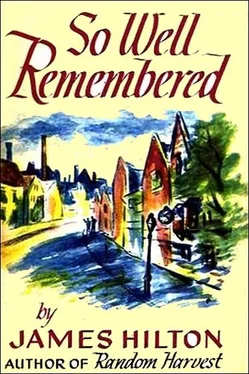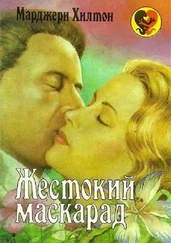Джеймс Хилтон - So Well Remembered
Здесь есть возможность читать онлайн «Джеймс Хилтон - So Well Remembered» весь текст электронной книги совершенно бесплатно (целиком полную версию без сокращений). В некоторых случаях можно слушать аудио, скачать через торрент в формате fb2 и присутствует краткое содержание. Год выпуска: 1945, Жанр: Проза, на английском языке. Описание произведения, (предисловие) а так же отзывы посетителей доступны на портале библиотеки ЛибКат.
- Название:So Well Remembered
- Автор:
- Жанр:
- Год:1945
- ISBN:нет данных
- Рейтинг книги:5 / 5. Голосов: 1
-
Избранное:Добавить в избранное
- Отзывы:
-
Ваша оценка:
- 100
- 1
- 2
- 3
- 4
- 5
So Well Remembered: краткое содержание, описание и аннотация
Предлагаем к чтению аннотацию, описание, краткое содержание или предисловие (зависит от того, что написал сам автор книги «So Well Remembered»). Если вы не нашли необходимую информацию о книге — напишите в комментариях, мы постараемся отыскать её.
So Well Remembered — читать онлайн бесплатно полную книгу (весь текст) целиком
Ниже представлен текст книги, разбитый по страницам. Система сохранения места последней прочитанной страницы, позволяет с удобством читать онлайн бесплатно книгу «So Well Remembered», без необходимости каждый раз заново искать на чём Вы остановились. Поставьте закладку, и сможете в любой момент перейти на страницу, на которой закончили чтение.
Интервал:
Закладка:
George’s conviction of failure, which had somehow become suspended during the conversation, now returned with a hard hit to the pit of the stomach. “Aye,” he said heavily. “I guessed as much.”
“Do you think you will try again, Mr. Boswell?”
“I dunno, sir. I dunno if I’ll have the time to.”
“Why not?”
“You see, I’m on the local Council and I run a newspaper—there’s a heap of work in all that—work that I can’t cut down on. If it was just a question of giving up fun or a hobby I wouldn’t mind, but when it means important things…”
“Such as?”
“Well, sir, I doubt if you’d be interested in all the details, but I’m trying to get a post-war slum-clearance scheme adopted by the Council, and that’s a job, I can tell you—if you knew the sort of place Browdley is.”
“H’m, yes… I understand. And I do not dispute the importance of such work, or the priority you feel you must give to it. What does puzzle me —a little—is your motive in entering for this examination at all. Did you feel that a university degree would help you politically— or professionally?”
“No, sir, it isn’t that. But I thought it might help me—sometimes —inside myself—to feel I was properly educated.”
“And what do you mean by ‘properly educated’?”
George pondered a moment, then replied: “I’ll put it this way, sir— sometimes I read a book that seems to me just plain stupid, but because I’m not properly educated I can’t be sure whether IT’S stupid or whether I’M stupid.”
A smile creased over the older man’s face as he burrowed afresh among the papers, finally discovering one and holding it up before his spectacles. “H’m… h’m… Such a pity, Mr. Boswell—such a pity… Mind you, I didn’t mark these English papers myself, so of course I don’t know whether…” And then a long pause, punctuated by more throat-clearings and spectacle- fidgetings. “Take this question, for instance—‘What do you know of the Pathetic Fallacy?’ I see, Mr. Boswell, that your answer is ‘Nothing’, for which you have been given no marks at all.”
George felt it was rather unfair to rub it in; if he had failed, he had failed; and when (since the examination) he had found out what the Pathetic Fallacy really was, it had turned out to be so different from anything he could possibly have guessed that he thought he had at least done well not to try. So with this vague self-justification in mind he now blurted out: “Well, sir, it was the truth, anyway. I did know nothing and I said so.”
“Precisely, Mr. Boswell. I have no reason to suppose that your answer was not a perfectly correct one to the question as asked, and if the questioner had wished to judge your answer on any other merits it seems to me he should have used the formula ‘STATE what you know’—not ‘WHAT do you know?’ I shall therefore revise your rating and give you full marks for that particular question—which, I think, will just enable you to reach the minimum standard for the examination… My congratulations… I hope you will find time to work for the final examination next year…”
“Oh yes, sir—yes, INDEED, sir!”
But George hadn’t found time, after all, because the year ahead was the one during which he had met and married Livia.
And what did he know of Livia, for that matter?
Browdley streets were deserted as he closed the door of the newspaper office behind him. From Market Street he turned into Shawgate, which is Browdley’s chief business thoroughfare; he walked on past all the shops, then through the suburban fringe of the town—‘the best part of Browdley’, people sometimes called it. But the best part of Browdley isn’t, and never was, so good. The town consists mainly of four-roomed bathroomless houses built in long parallel rows, dormitories of miners and cotton operatives who (in George’s words to Lord Winslow) had piled up money like muck for a few local families. George had not added that his wife belonged to one of those families, even when the mention of Channing and Felsby’s mill would have given him a cue. For Livia was a Channing—one of the Channings of Stoneclough… and suddenly he decided that, since he was trying to kill time by walking, he would walk to Stoneclough. It was even appropriate that he should take there his problem, his distress, and that brooding sub-current of anger.
Presently his walk quickened and his head lifted as if to meet a challenge; and in this new mood he reached the top of a small rise from which Browdley could be seen more magically at night than ever in the daytime; for at night, especially under a moon, the observer might be unaware that those glinting windows were factories and not palaces, and that the shimmer beneath them was no fabled stream, but a stagnant, stinking canal. Yet to George, who had known all this since childhood, there were still fables and palaces in Browdley, palaces he would build and fables he would never surrender; and as he walked to Stoneclough that night and looked back on the roofs of the town, he had a renewal of faith that certain things were on his side.
The trouble with Livia, he told himself for the fiftieth time, was that there was no REASON in so many things that she did; or WAS there a reason this time—the reason he had been reluctant to face?
He climbed steadily along the upland road; it was past one in the morning when he came within sight of Stoneclough. The foothills of the Pennines begin there; there is a river also, the same one that flows dirty and sluggish through Browdley, but clean and swift in its fall from the moorland, where it cuts a steep fissure called a ‘clough’, and in so doing gives the place a name and provides Browdley citizens with a near-by excursion and picnic-ground. The first cotton mills, driven from a water-wheel, were set up in such places towards the end of the eighteenth century, and one of them belonged to a certain John Channing of whom little is known save that he died rich in the year of Waterloo. The shell of the old greystone mill that made his fortune still stands astride the tumbling stream; but the rows of hovels in which the workpeople lived have long since disappeared, though there are traces of them on neighbouring slopes, where sheep huddle in rain against weed- grown fireplaces.
Gone too is the first Channing house that adjoined the mill; it was demolished about the time of Queen Victoria’s accession, when the Channing family, by then not only rich but numerous, built a new and much more pretentious house on higher ground where the clough meets the moorland. About this time also it became clear that steam would oust water-power in the cotton industry, and with this in their shrewd minds the Channings took another plunge; live miles away, on meadows near what was then the small village of Browdley, and in partnership with another mill-owner named Felsby, they built one of the first large steam-driven mills in Lancashire. Other speculators obligingly built Mill Street for the new workers to live in, and the same process, repeated during succeeding decades with other mills and other streets, made Browdley what it is and what it shouldn’t be—as George said (and then waited for the cheer) in his popular lecture ‘Browdley Past and Present’, delivered fairly frequently to local literary, antiquarian, and similar societies. Yes, there was one question at any rate to which he could return a convincing answer—“What do you know of Browdley?”—and that answer might well be: “More than anyone else in the world.”
Suddenly George saw the house—the house which, like the locality, was called Stoneclough. It showed wanly in the moonlight against the background of moorland and foreground of tree-tops. The moon was flattering to it, softening its heavy Victorian stolidity, concealing the grim undershadow that Browdley’s smoke had contributed in the course of half a century of west winds. This was the house the Channings had lived in, the Channings of Stoneclough. A succession of Channings had travelled the five miles between Stoneclough and the Browdley mill on foot, on horseback, by pony carriage and landau, by bicycle and motor-cycle and car, according to taste and period; and the same succession had added to the house a hodge-podge of excrescences and outbuildings that had nothing in common save evidence of the prevalent Channing trait throughout several generations; one of them might construct a billiard-room, another remodel the stables, yet another add terraces to the garden or a bow-window to the drawing-room —but whatever was done at all was done conscientiously, always with the best materials, and with a rooted assumption of permanence in the scheme of things.
Читать дальшеИнтервал:
Закладка:
Похожие книги на «So Well Remembered»
Представляем Вашему вниманию похожие книги на «So Well Remembered» списком для выбора. Мы отобрали схожую по названию и смыслу литературу в надежде предоставить читателям больше вариантов отыскать новые, интересные, ещё непрочитанные произведения.
Обсуждение, отзывы о книге «So Well Remembered» и просто собственные мнения читателей. Оставьте ваши комментарии, напишите, что Вы думаете о произведении, его смысле или главных героях. Укажите что конкретно понравилось, а что нет, и почему Вы так считаете.










